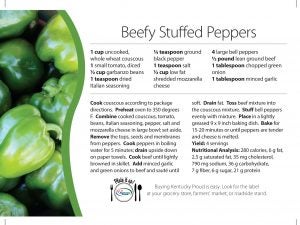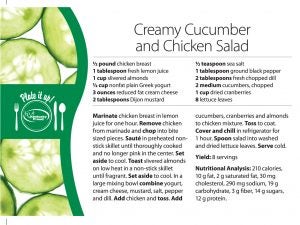Meal-planning helps efficiency and your health — here’s why
Published 6:57 pm Tuesday, July 30, 2019
By ALETHEA PRICE
Boyle County Extension Agent for Family and Consumer Sciences
Deciding what to have for dinner each night can be a daily conundrum for many of us. As a result, we may find ourselves in line at a fast food restaurant more than we care to admit. But it does not have to be this way. By preparing at least portions of our meals in advance, we can have home cooked, healthy meals on a regular basis. 
Research shows people who regularly do meal preparation in advance tend to consume more fruits and vegetables and eat a more balanced diet overall. Meal prepping is extremely popular as it allows us to live our hectic lives while still providing our families with nutritious foods. It saves time because steps in the cooking process are already completed to varying degrees. The process may include simply prepping ingredients to be used later to completely preparing dishes that are stored until later use. Meal prepping also takes some of the stress and frustration out of deciding what to eat each night.
If you have never tried meal prepping before, start small and don’t invest a lot of money. At first, aim to prepare two to three meals per week in advance. Find nutritious recipes that your family would enjoy and make a grocery list of the needed ingredients. Allow your family to chime in on the meals or ask them if there is a new food or recipe they would like to try.
It is easier to set aside one day for grocery shopping and meal prepping as it cuts down on the number of times you have to handle the food and gives you a set time to work meal prepping into your busy schedule. Include your family in the food preparation. Not only will it help spread out the cooking responsibilities, but it will also teach your family basic cooking skills and healthy eating habits.
Remember food safety when preparing food. When using a cutting board, slice vegetables before cutting meat. Store produce and meat separate to avoid contamination. While most people associate meal prepping with dinnertime, you can also prepare quick breakfasts or use leftovers for lunches. When dinner is cooking, make the most of your time in the kitchen. Chop veggies for a salad the next day, or slice some fruit for a quick grab-and-go snack.
After the food is prepared, store it in an airtight container and either place it in the refrigerator or freezer depending up on how soon you plan to eat it. Consume refrigerated meals within five days. Freezing will allow you to store meals for a longer time.
As you become a meal-prepping pro, you can watch for sales to stock up on food staples and increase the number of meals you prepare at home. This is a great tip to save money on food in the long run.
More information on meal prepping and healthy eating is available at the Boyle County office of the University of Kentucky Cooperative Extension Service. Email me at a.price@uky.edu
Check out these meal prep ready recipes the whole family will love.
Email Alethea Price at a.price@uky.edu





